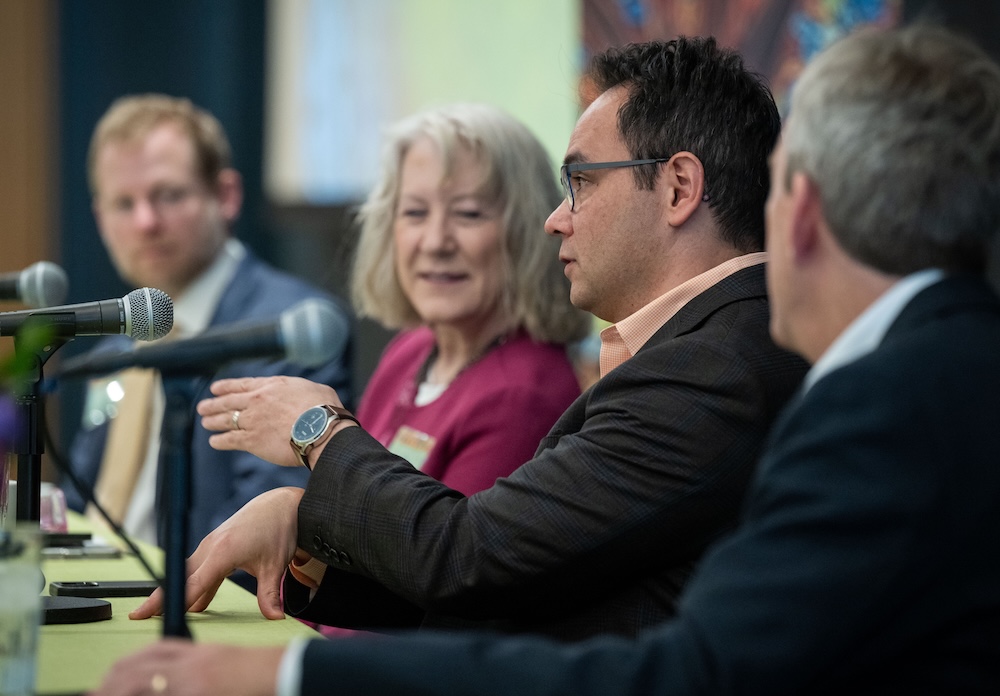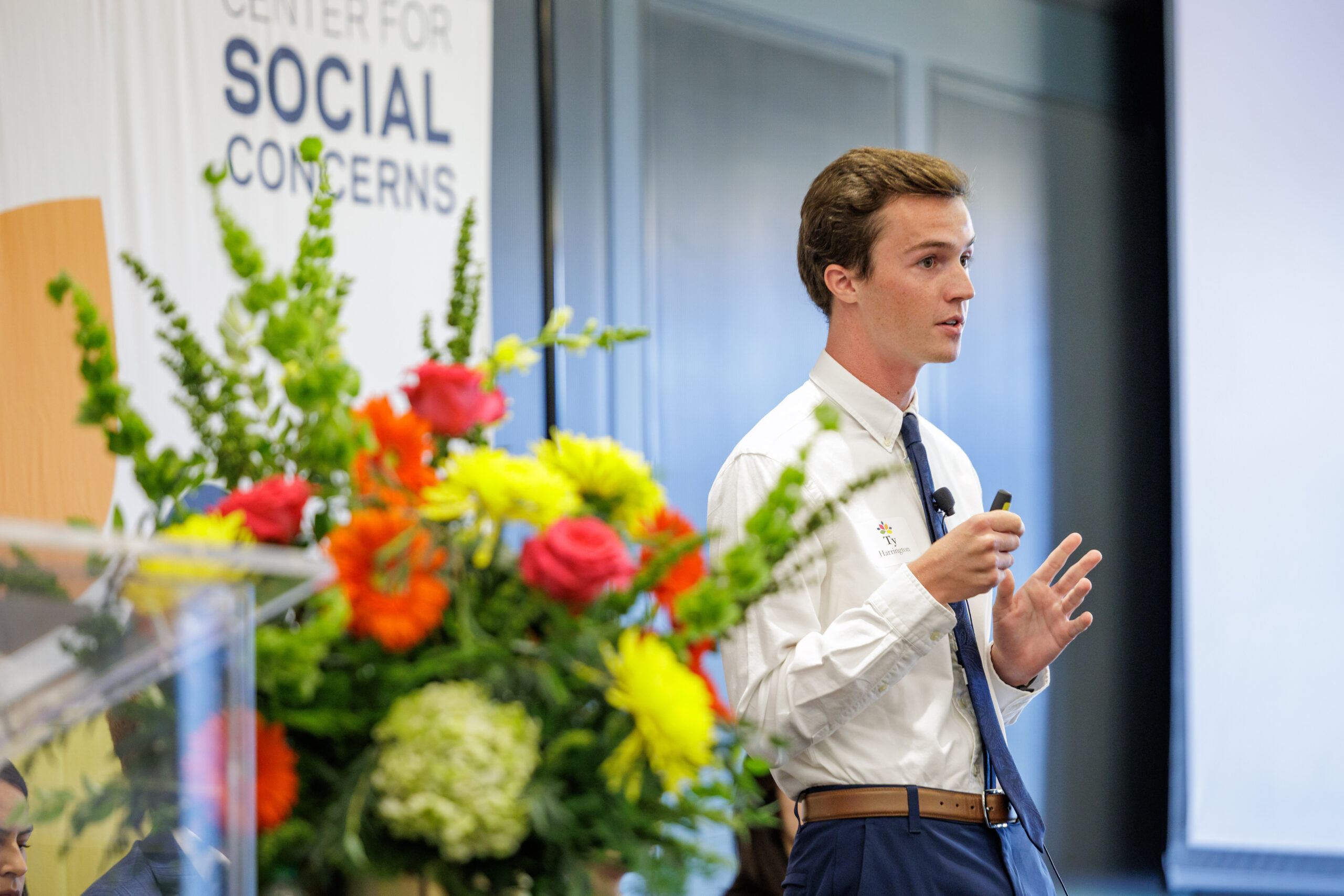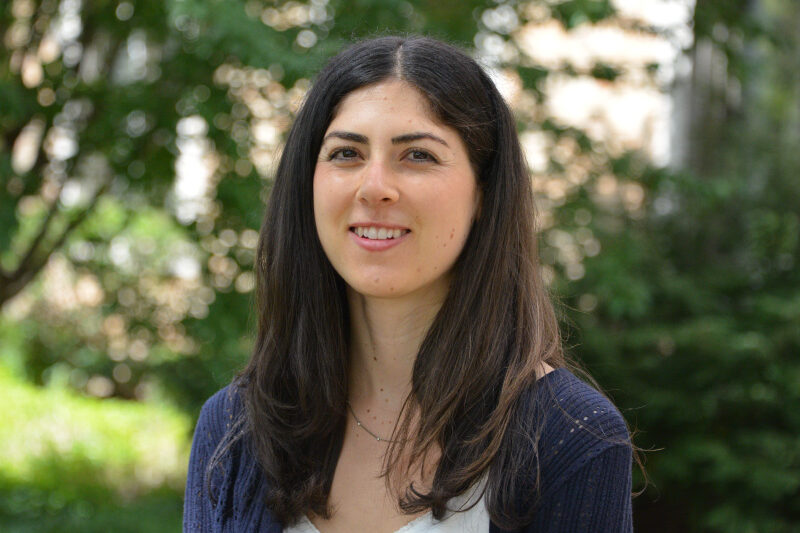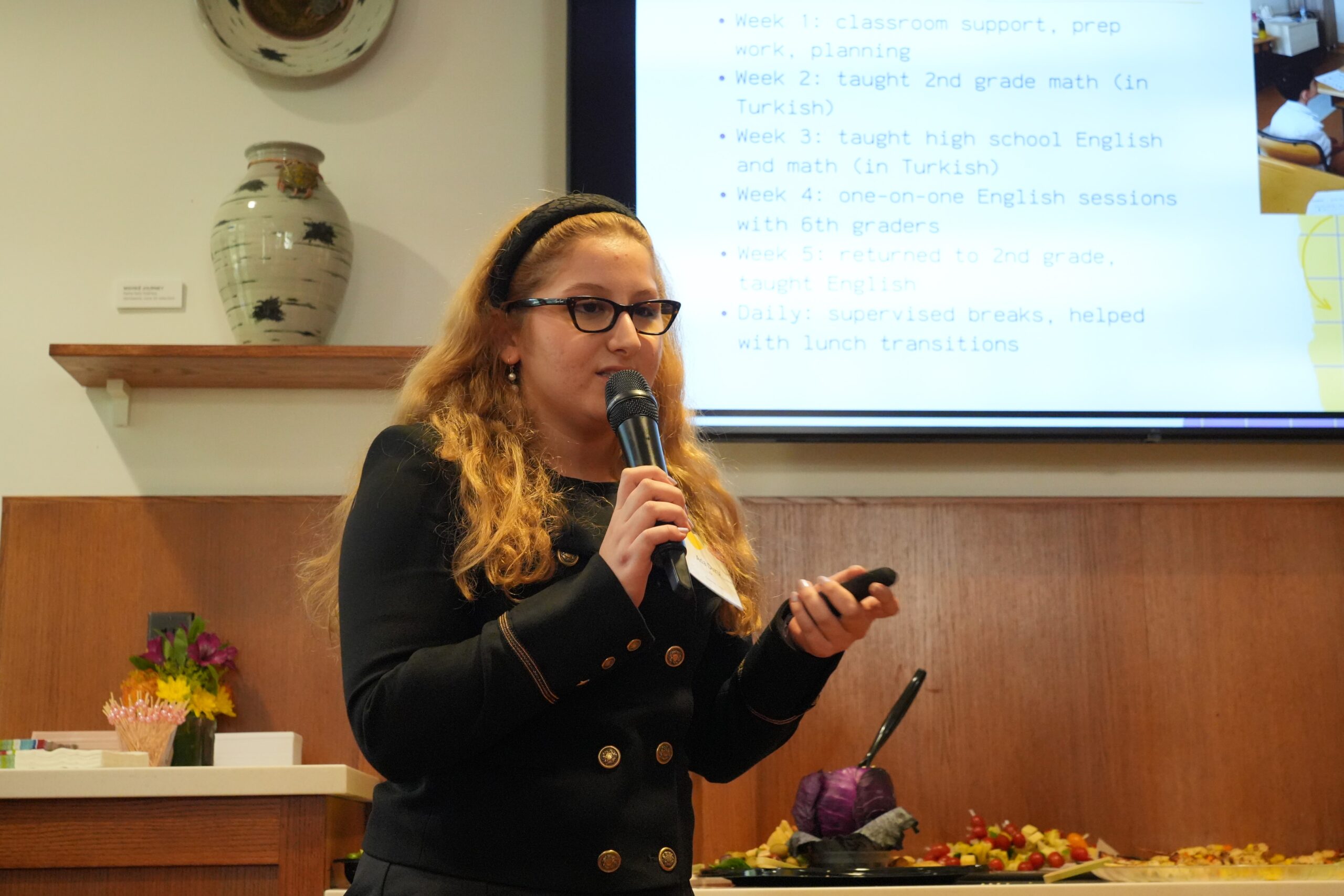Forming character through friendship
Virtues & Vocations conference promotes human flourishing in professional education
June 18, 2025
“One of the most important things that will happen if my work is successful is that I will have helped create new friendships on campus,” Duke University theologian Norman Wirzba stated about his role as director of research in Duke’s Office of Climate and Sustainability.
Wirzba’s comments came during a fireside chat with Suzanne Shanahan, the Leo and Arlene Hawk Executive Director of the Institute for Social Concerns, at the second annual Virtues & Vocations conference on Higher Education and Human Flourishing. The conference, held in late May, took place in McKenna Hall on the scenic campus of the University of Notre Dame.

“This is a time for us to figure out how we turn toward each other to start asking questions about who we want to be,” Wirzba charged the audience of 150 scholars, practitioners, and university administrators from across the country and as far away as Mexico City, Madrid, and Rome. “What kinds of relationships do we need to develop to do research differently in the future?”
Over the course of the three-day conference held in McKenna Hall, interdisciplinary relationships were formed and nourished through discussions about the role of character in the professions and structured spaces for shared reflection on the beauty, wonder, and joy of the work of virtue formation in higher education.
Reflecting on Wirzba’s comments, Shanahan stated that “the essence of everything we do in the pursuit of justice is about cultivating formative relationships. And this is part of the tension that underlies our work in the character space: How do we do this work? Who do we do it with? And what are the essential priorities of doing this work on a day-to-day basis?”
The conference addressed these questions through plenary panels, workshops, and keynote addresses, opening with a keynote address by Katy Milkman, the James G. Dinan Professor at The Wharton School of the University of Pennsylvania. Drawing on her original research and the work of her world-renowned scientific collaborators, Milkman shared insights from her national bestseller How to Change on how to overcome barriers to change.
“A lot of solutions to barriers to change can involve other people,” she stated. “It turns out when we coach someone else, when we support and mentor someone else toward a goal that we hope to achieve, it actually improves our own confidence and competence at achieving that goal.”

“This experience itself for me, just being here, is very dignifying,” said Anderson Spickard, III, in a panel discussion about how professions of character can change the world. Spickard is dean, professor of internal medicine, and special assistant to the president for health affairs at Thomas F. Frist, Jr. College of Medicine at Belmont University. He added, “The truth is that we are doing something extraordinary, and we’ve been called to be part of something bigger than ourselves.”
Anna McEwan, dean and professor at Orlean Beeson School of Education at Samford University, concurred. “What you’ve provided in this conference–what I think is needed in many of our fields, including medicine and engineering–are the opportunities for reflective pauses, the opportunities for deep thinking and conversation.”
For McEwan, the conference’s focus on relationships and character formation was not at odds with other measures of success at universities. She shared that she often tells her faculty, “Character doesn’t compete with competence; character amplifies competence. It’s a force multiplier.”
Similarly, David Go, vice president and associate provost for academic strategy and the Viola D. Hank Professor of Aerospace and Mechanical Engineering at Notre Dame, described character as the foundation of educational formation in engineering at Notre Dame. Instead of offering separate courses in character or ethics, Go stated that the College of Engineering integrates character and ethics into their courses. “Then you are creating a fully formed three-dimensional engineer,” he said.

To assist others in developing this approach to courses, an Integrating Virtue Together workshop ran concurrently with the conference, with 25 attendees participating in programming that ran before and after the conference. Each of the participating faculty members was selected from a large pool of international applicants and given the task of revising a course they will teach in the upcoming year so that it intentionally cultivates two to three virtues.
In addition to the conference sessions and workshops, friendships were formed over meals, even one overlooking the football field. The conference also provided space for a guided tour of the stained glass at the Basilica of the Sacred Heart, a visit to the special collections at Hesburgh Library, a nature walk around St. Mary’s Lake and St. Joseph’s Lake, lawn games outside McKenna Hall, and a late night gathering at the Geddes Hall Coffee House and patio.
“The sessions I attended were inspiring and challenging,” stated Emily Hunt-Hinojosa, senior research scholar and associate director of partnerships at Wake Forest University’s Program for Leadership and Character, “but it was the space in between the sessions—the meals, connections, and of course, the buttons and tattoos—that really added to the meaning-making. I felt a sense of camaraderie and shared purpose with attendees and have appreciated all of the follow-up conversations, idea sharing, and relationships that emerged out of such an intentional time.”

“This is my favorite conference,” Paul Blaschko, assistant teaching professor and director of the Sheedy Family Program in Economy, Enterprise, and Society at Notre Dame, stated in the closing keynote address. “I’ve just been really energized and excited.”
Other attendees concurred with this assessment. “The hospitality of this conference is unparalleled,” one attendee wrote following the conference. Another added, “Hands down, my experience was the most life-giving one in my career of going to many academic conferences.”
“Keep at this,” another attendee wrote. “I feel elevated coming from your conference with all the new and progressive ways of expanding how I think about what’s possible in the classroom.”
Virtues & Vocations, funded by the Kern Family Foundation, is a national forum for scholars and practitioners across disciplines to consider how best to cultivate character in pre-professional and professional education. In addition to the annual conference, it hosts faculty workshops and monthly webinars and engages issues of character, professional identity, and moral purpose through its magazine Virtues & Vocations and other publications. Learn more at socialconcerns.nd.edu/virtues/.
Photography by Steve Toepp / Midwest Photographics.
Related Stories
-
Social Concerns Summer Fellow returns to India for ongoing research
-
ReSearching for the Common Good: Solbee Kang
-
Bridging worlds through art—Kyla Walker joins institute as international poetry justice fellow
-
The power of encounter—RISE Hometown prepares incoming students for learning in service of justice at Notre Dame
-
The beauty of everyday democracy—Institute convenes scholars, practitioners, Luke Bretherton for democracy conference





